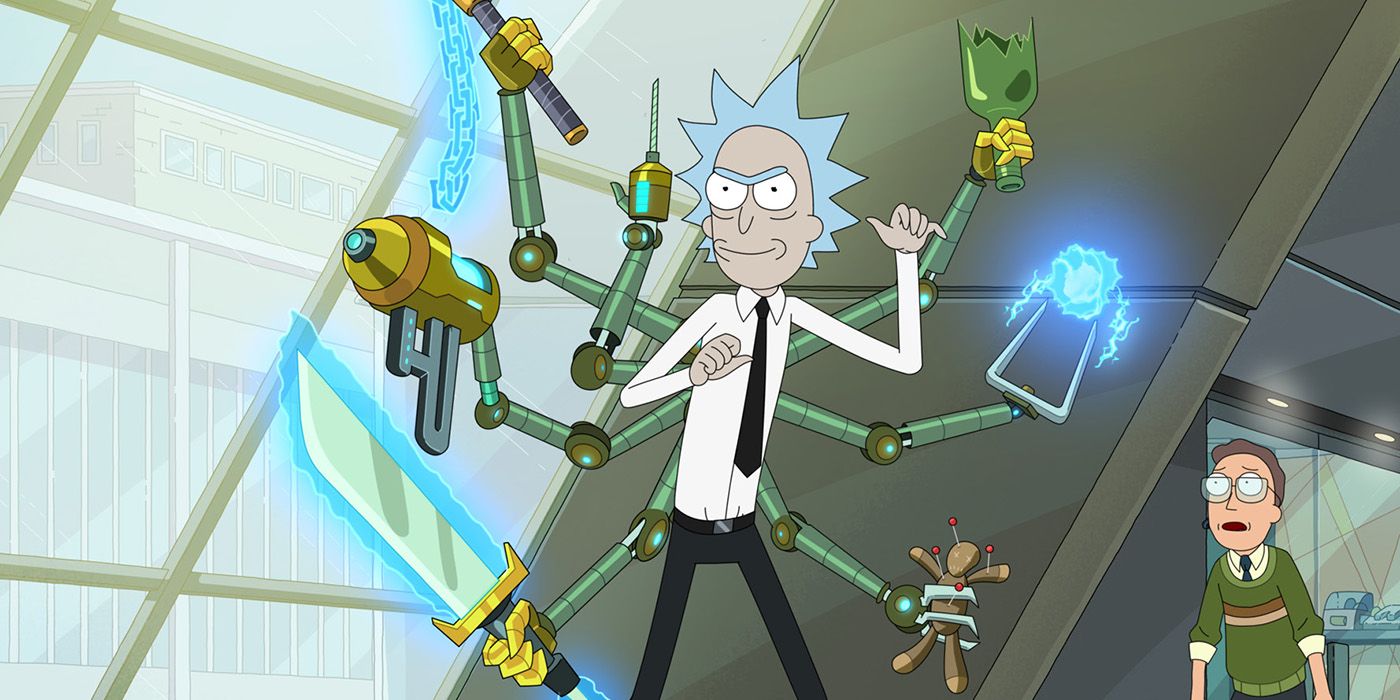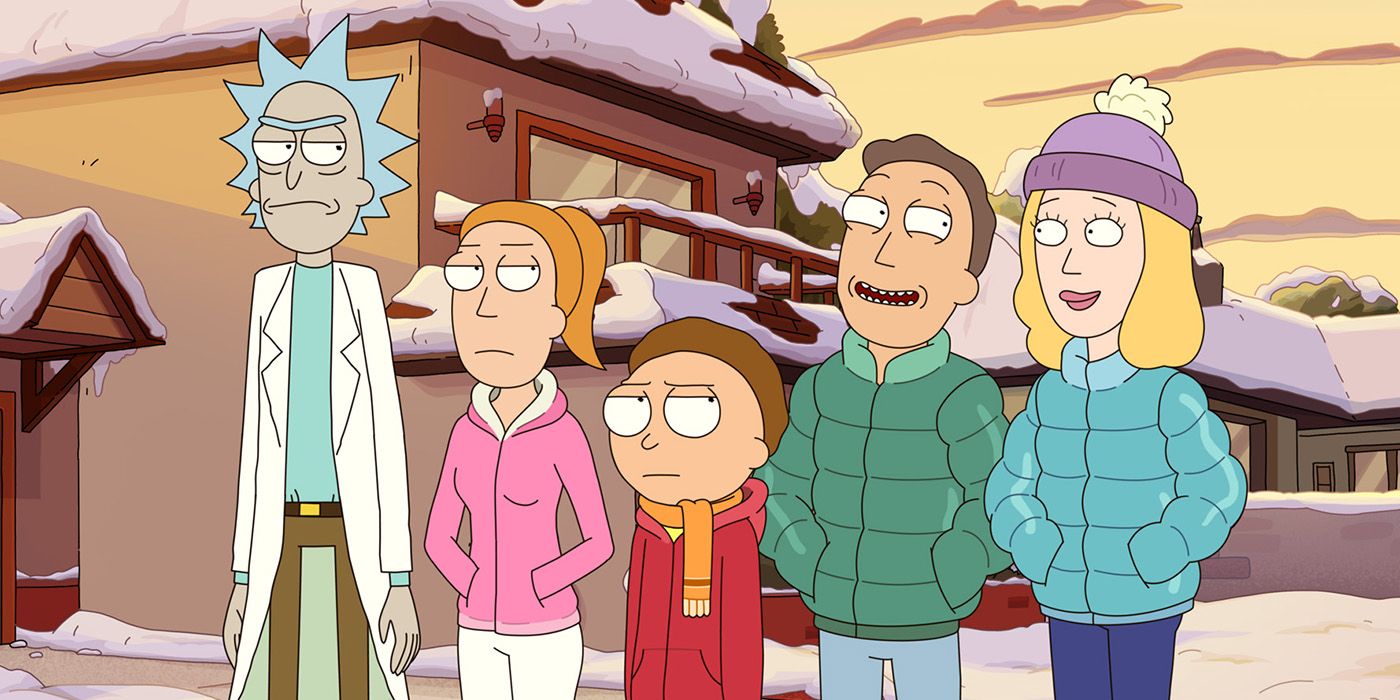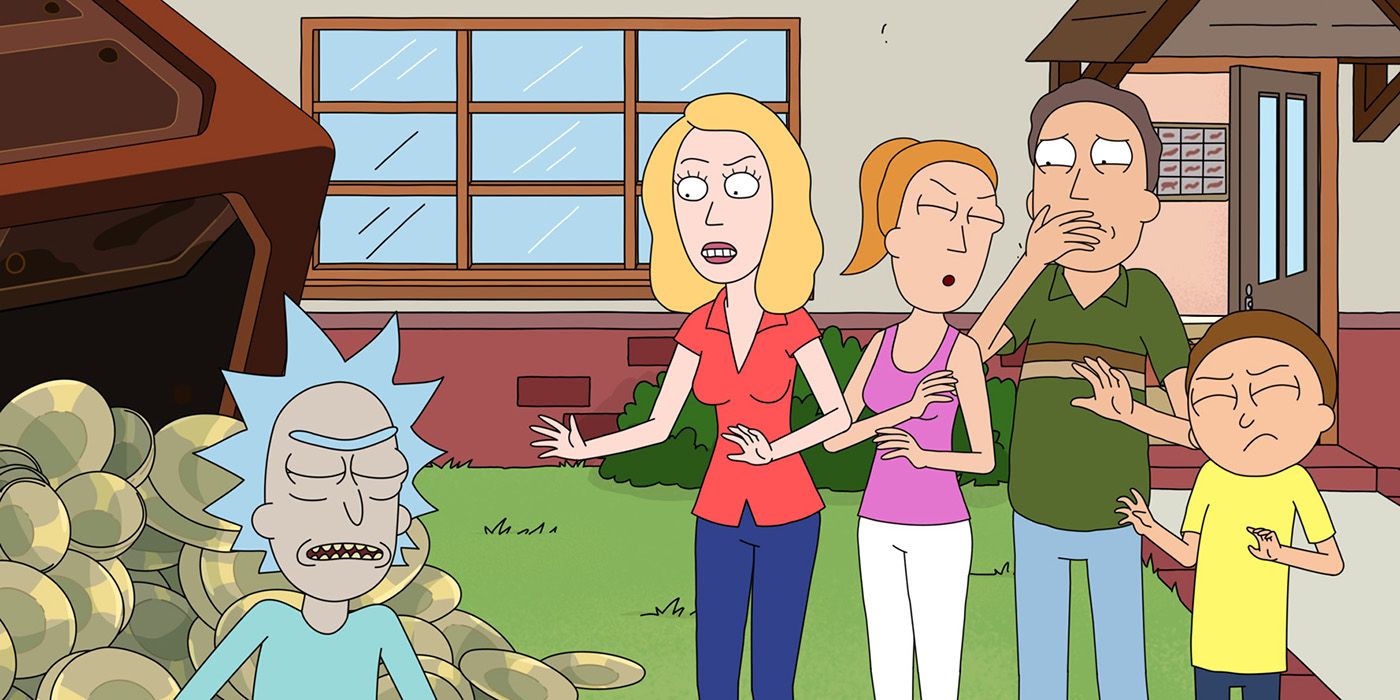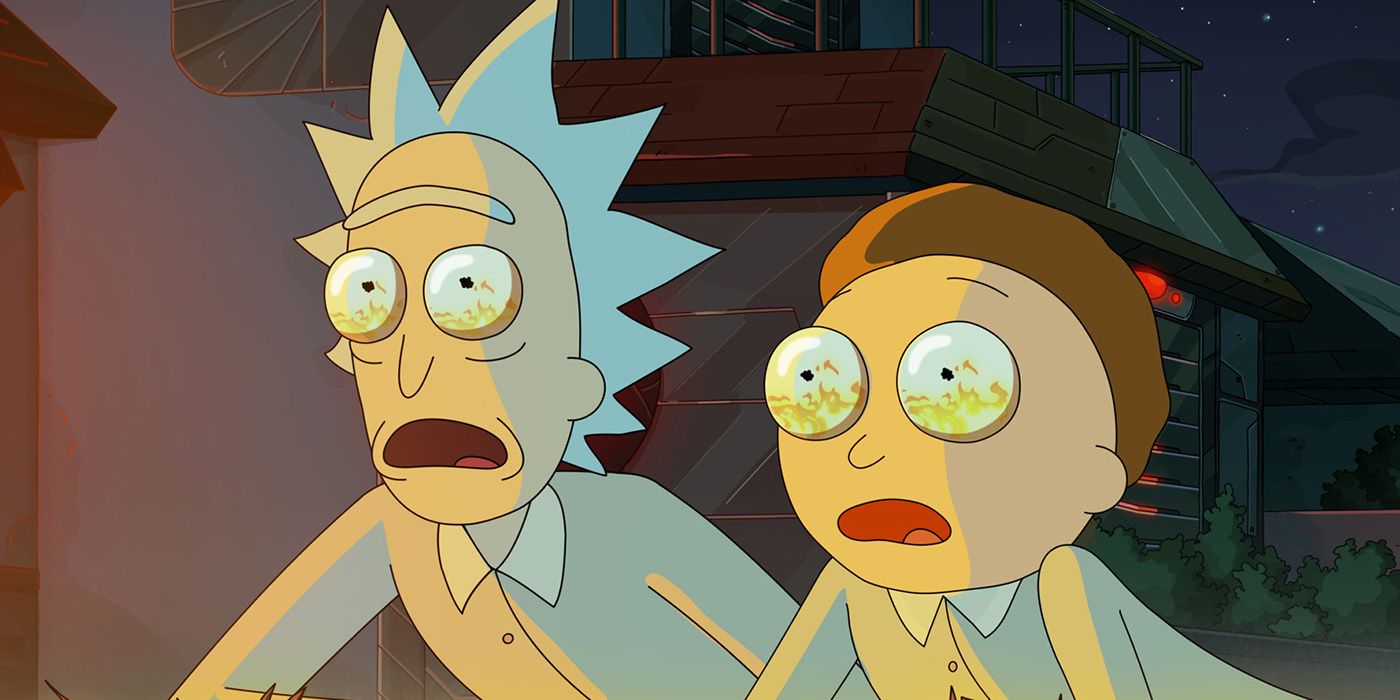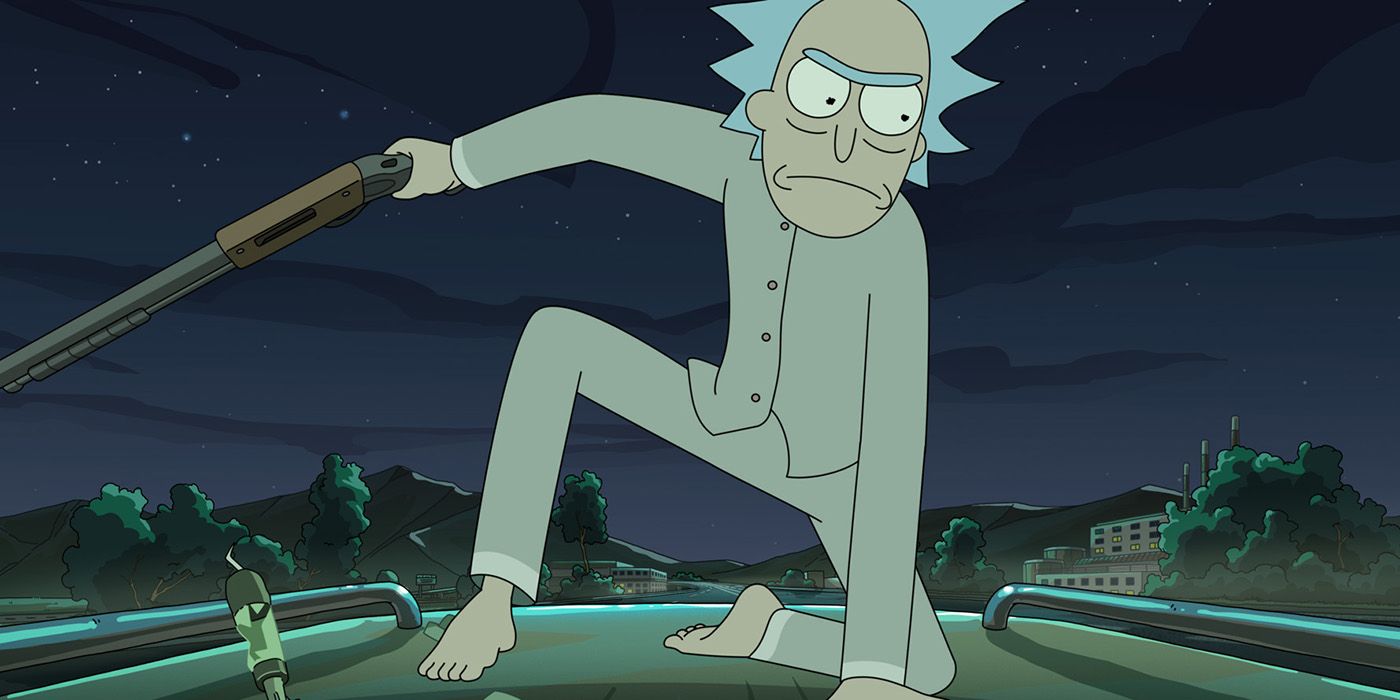The Smith family is back for more bizarre adventures with Rick and Morty season 6. Co-created by Dan Harmon and Justin Roiland, the Adult Swim series revolves around the titular mad scientist and his grandson as they venture through the multiverse with the use of the former's portal gun.
Roiland also leads the cast of Rick and Morty as both characters alongside Sarah Chalke as Rick's daughter Beth, Spencer Grammer as his granddaughter Summer and Chris Parnell as his son-in-law Jerry.
In anticipation of the premiere, Screen Rant participated in a roundtable interview with co-creator Dan Harmon and producer Scott Marder to discuss Rick and Morty season 6, how the show has changed over the years, its possible future, and more.
CBR: Already from the jump, the first episode is so character-driven and so building and additive to the things that you’ve already established within the show, and then the second episode gets to be just kind of a mix of a fun parody and a really good sci-fi story. The show has such a tonal mishmash, how does an episode’s tone evolve during the production of an episode, do you start knowing this one’s going to be kind of a parody, this one’s going to be character-driven, or does that evolve organically during the process?
Dan Harmon: You try to control that, you try to recognize from the premise forward, I’ll say things like if a writer wants to do something that’s like, “Oh, what if multiple versions of Rick do this or that?”, then I might say something like, “Look, if we’re gonna do this, the challenge is going to be that it needs to be incredibly emotional, because we’ve plundered this concept. No one’s going to be—including the characters on screen—no one’s going to have their mind blown by the idea of multiple Ricks.”
So, I’ll say something like that, but you may as well just be saying — like, you’re an airplane pilot and you’re going like, “Look, this flight has to be smooth,” it’s like, “Well, yeah, okay,” and then what happens happens. The way it really goes is you kind of — I’ve never parented, but it’s the easiest metaphor, because your job has to be to let it fly and then watch and make adjustments to what’s happening. You’re simultaneously unable to determine until—I mean, we do so much re-breaking, sometimes, when we see the first version of the episode as drawn by artists.
It’s got to be very frustrating for them, but at the same time it’s a better way to figure things out than writing endless drafts. I used to sit there until I felt it was Citizen Kane on a keyboard while everyone was like, “Dude, we have to draw something.” And I’d be like, “You don’t have to draw it if it’s bad. You’ll thank me when you don’t have to change it.” But we would still have to change it. That was my big revelation was like, “Dude, I’m not doing anybody any favors, I need to let stuff go when it’s good enough for now, and then have the writing process be less like it’s a blueprint and more like it’s a memo. It’s a conversation starter, and then we have to work together as 200 people going around and around and let this thing develop like a child.”
Scott Marder: Yeah, I don’t think it’s a goal of like this next one, the third one, we’re going to make this more of a blah, blah, blah. Normally, there’s always a lot of ideas on the table and just the good ones spark more joy than the less good ones, and those are the ones that we just gravitate towards and start slotting in as the next one in the season.
Screen Rant: With Rick and Morty season 6, I love that it kicks off with exploring the consequences of the season 5 finale, uh, even if it does sort of fix them right away, much like the season 3 premiere really worked with the season 2 finale. Was that the specific goal going into writing season 6, was to figure out a way to undo what Evil Morty did at the end of 5?
Dan Harmon: No, not to undo it, but we knew we had to answer for it. When you see a cliffhanger like the end of season 5, it’s kind of like buying on a credit card, that means when we were at the end of season 5, we were kind of like, “How do you end this season?” and sometimes the answer is, “Well, we can exchange debt for credit. We can basically put ourselves on the hook, and it’ll be a good finale, but only because it’s making people wait, which is a tough thing to decide to do. Honestly, it’s more of a survival response, I’m like, “Okay now what do we owe? We have to pay this bill.” That’s how I look at it, which isn’t as romantic, but I don’t know, Scott, do you have a different—
Scott Marder: We were excited to tackle it, it was very high pressure, we put a real big episode out there with a lot of loose ends. It made it really challenging in season 6, because I feel like we actually took a swing at a few versions of it that just didn’t feel like it lived up to the finale yet, until I feel like in the eleventh hour, we found what is now 601, that kind of felt like it did everything in the middle of a season. But, yeah, it was a lot of work, but I’m really grateful for the one that we ultimately found and landed for you guys, because it feels like it does everything.
CBR: It really does, because I was not expecting the return of original Jerry, it really brings back so many threads on top of pulling on the ones you’ve already established. One of the things I’ve always held up as one of the real great strengths of the series, and you guys and the rest of the creative staff, is you can build such massive new settings, new scopes, large worlds, and then in the next episode, it’s gone, even with like The Citadel. How do approach something like that from an episode-to-episode basis, what is that like to kind of have to build up these new worlds and then immediately burn them down and then move on to the next one?
Dan Harmon: For me, what that is is symptomatic of an aversion to commitment. It’s not so much a challenge that’s put upon us — unless ‘us’ can be separate, like, it might be a challenge that I have put upon some of the writers. I’m too scared to just start telling stories in a consistent environment.
I think it's better to just set fire to the stuff, because to not do so is to say, “This is precious,” and if you say this is precious, you might be wrong, and then you suck, and I can’t suck, so I’m just gonna introduce these characters that, on any other show, might be like, “Hey, let’s keep these guys around.” But then there’s the part of me that is incredibly, like, “I don’t want to let people down,” so I’m like, “Uh, whatever, that’s stupid, then they all die.” I think the show kind of inherits that from me, maybe, that’s like an ancestral psychological illness.
Scott Marder: Yeah, I felt like a combo of that and just our general excitement just keeps us always going to new worlds and new locations, just because the show is so limitless, you bring in a new writer, who’s been a fan of the show for the last ten years who just wants to play in this sandbox, and that’s why every episode feels like it’s a completely different sort of movie.
Screen Rant: This show is unique also in the sense that you guys had such a huge renewal order giving you a long future to really develop the arcs and characters throughout. Do you still have ideas in mind for potentially after that order to continue Rick and Morty?
Dan Harmon: Well, in my opinion, yeah, I very much expect the show to go beyond that [70-episode] order. I don’t think that’s jinxing it, I mean, it just seems like, “Okay, we’ve got a certain amount of momentum here.” The 70-episode order, to me, was like, “Well, how much can we commit to?”
It was a two-way street between us and the network saying we’re going to take this very seriously, right? We’re not going to go develop a bunch of stuff unless we hire like a Scott Marder to run the shop. But in any case, it’s a commitment to professionalism and stuff, and it was an important one. It’s like, “Oh, we got tenure, we’re told that we have a job tomorrow no matter what we do.” The result of that a couple of steps later is now Scott has got the show on such a schedule that, for the first time in the show’s life, we’re looking at doing a season every year. It worked great, getting that order was exactly what we needed to grow up.
Scott Marder: I plan to work on it until I’m like a nano-mist, like Morpheus in that last Matrix movie. Just like not in normal form anymore, kind of move in and out of rooms, always breaking the show.
Rick and Morty Season 6 Synopsis
Rick and Morty is the Emmy® award-winning half-hour animated hit comedy series on Adult Swim that follows a sociopathic genius scientist who drags his inherently timid grandson on insanely dangerous adventures across the universe. Rick Sanchez is living with his daughter Beth’s family and constantly bringing her, his son-in-law Jerry, granddaughter Summer, and grandson Morty into intergalactic escapades.
It’s season six and Rick and Morty are back! Pick up where we left them, worse for wear and down on their luck. Will they manage to bounce back for more adventures? Or will they get swept up in an ocean of piss! Who knows?! Piss! Family! Intrigue! A bunch of dinosaurs! More piss! Another can't miss season of your favorite show.
Check out our other interview with Rick and Morty stars Sarah Chalke & Chris Parnell.
Rick and Morty season 6 premieres on September 4 on Adult Swim.

